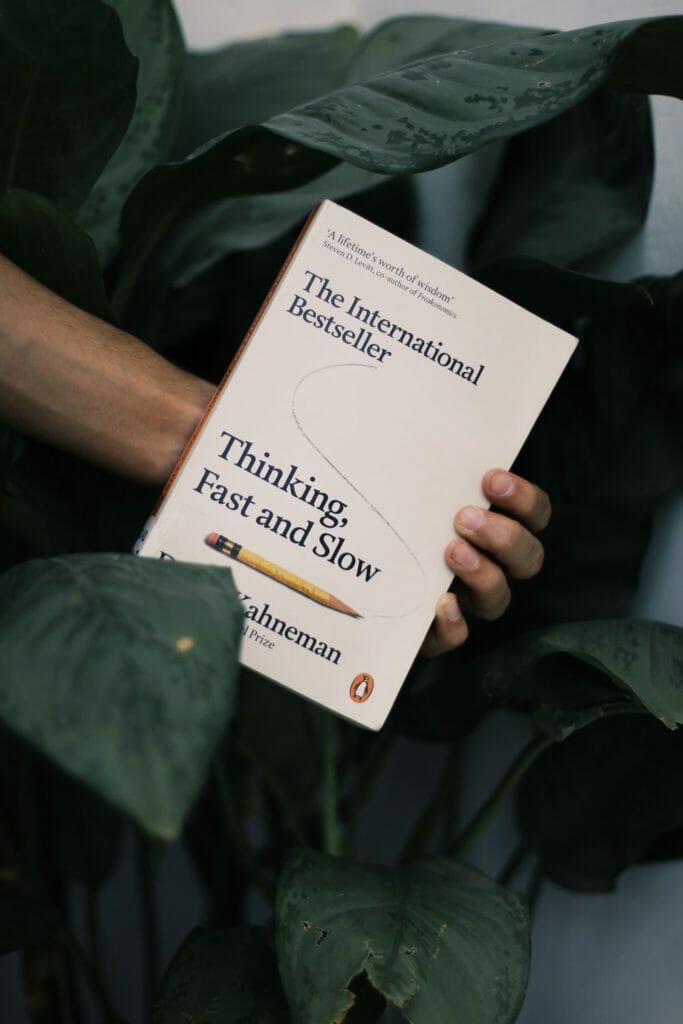What worked in SEO, content, and growth just a few months ago may not be effective today. Making things even more challenging, there’s so much noise. Is that top-ranked content on Google actually the best thing out there? Or is it the same “me too” content?
We identified top marketers based on some good-but-imperfect criteria (e.g., mentions on marketing sites, social media presence, recent presentations, etc.).
Then, we used that expert seed list to gather opinions on which people, sites, and books all marketers should listen to, read, or watch.
Our sample wasn’t a perfect representation of the marketing industry, and people on the list who knew about CXL were more likely to respond. Like every research project, there were limitations.
But among the 50 respondents, we saw some striking patterns on how the best “sharpen the saw”—and how you can, too. Here are six takeaways from the three open-ended questions we asked.
Table of contents
Which marketers do you learn the most from?
One of the best parts about being a marketer today is the ability to engage directly with some of the smartest minds today. You can invest in courses, books, and seminars, sure, but the amount of high-quality content available in blog posts, industry groups, and on social media gives you instant access to level up your skills.
So what did we learn?
1. There are a lot of fish in the sea.
All marketers have heard of Seth Godin. But the household names of marketing didn’t dominate our list.
In fact, we got 135 different names from a total of 150 responses. Many were names that you don’t see on the same old “these people have tens of thousands of Twitter followers” lists, such as Steven Tristan Young, Michelle Morgan, and Kameron Jenkins.
Investing the time to find those “hidden gems” gives you a competitive advantage over those who follow only the well-known names. When was the last time you actively searched for new marketers to follow and learn from?
One effective way to discover under-the-radar marketers is by looking at who the big names follow on Twitter. Many times, successful marketers follow a small amount of people, making each follow count.
2. Follow the practitioners
By and large, traditional “influencers” and “thought leaders” were rarely mentioned. Entrepreneur and motivational speaker Gary Vaynerchuk for example, came up just once.
The bulk of the responses included individuals who are in the weeds doing the work—or have gotten out of the weeds through years of great results:
- Benji Hyam, co-founder of Grow and Convert, doesn’t just write about content marketing; he built a content marketing agency by getting his clients results.
- Web Smith, founder of 2PM, isn’t just tweeting about DTC strategy; he co-founded the popular clothing brand Mizzen+Main and is an investor and advisor to dozens of top-performing companies.
- Lily Ray is a sought-after speaker because she’s overseen and executed strategies for household brands as Director of SEO at Path Interactive.
If you’re an analyst, you may spend most of your time seeking out tactical information. But paying attention to how marketers have moved up the ranks—even if you love the individual contributor life—shows how to advance your career. You may become more aware of the skillsets you don’t yet have or better understand what managers and executives need and value.
You may also want to expand your list beyond well-known marketers. As one survey respondent shared, “I follow the ones no one knows about. Usually it’s the in-house folks.”
Compared to freelancers and consultants, many in-house practitioners neglect their online brand because it doesn’t directly affect their ability to generate business. One way to find in-house practitioners is to search Linkedin for companies you respect, then filter the list of employees for those in your field.
Which marketing websites do you pay the most attention to?
Following world-class marketers online is one thing, but what websites did our survey participants keep an eye on regularly? And what were the learnings?
3. Go deep, not wide.
Our survey data was anonymous, but it was easy to guess respondents’ niches. Why? Many listed multiple websites, all covering the same topic—there was a clear focus for what they read regularly.
For example, one response listed Sterling Skhy, Whitespark, and SearchLab Digital—all local SEO sites. Another shared First Round, SaaStr, and Paul Graham’s blog. (Take a guess what they work on!)
There’s certainly a benefit to reading a wide range of marketing publications, but don’t go wide at the expense of going deep. Even top, T-shaped marketers focus first on the space they “own.”
4. Top marketers rely more on people, not websites, to curate content.
Another interesting theme: Lots of responses listed “Twitter” and “newsletters” rather than any specific site:
- “I mostly read newsletters now: Kevin Indig, Justin Mares, and CXL.”
- “I don’t really consume content on websites. Maybe Medium from time to time.”
- “I don’t read blogs anymore, just filtered Twitter and LinkedIn feeds, plus email content.”
- “Ironically, I don’t follow specific websites. I follow smart people on Twitter and Linkedin and pay attention to what they point me to.”
Several newsletters, in contrast, came up more than once: Morning Brew, The Information, and the SEO for the Rest of Us newsletter. (A bit surprisingly, there were no mentions of Facebook or Slack groups.)
Sparktoro’s Trending page, which elevates popular marketing content on Twitter, got a number of mentions, too. The shift away from blogs and toward individual (or algorithmic) recommendations reinforces a trend that Superpath’s Jimmy Daly wrote about on Animalz years ago:
“Here’s what a publication mindset looks like in practice:
- Topics are horizontally integrated, meaning that content creators cover a broad range of topics rather than the full range of depth.
- Posts are published on a strict schedule, so it’s hard to make time for content that requires additional time and energy.
- Content serves an audience, therefore timeliness is prioritized.
And here’s why those things are problematic:
- Depth is almost always more useful to readers than breadth.
- Content efforts that require a lot of effort (think benchmark reports, data analysis, etc.) often deliver 10x the results of a post that requires less effort.
- The huge majority of readers are not regular visitors to your site. Instead, they seek out specific articles to solve specific problems.”

Animalz took a look at “a few very successful SaaS blogs and found that, on those sites, only about 17% of visitors are returning.” If you’re still consuming content based on what a handful of established blogs show you, you may be missing out on bleeding-edge ideas.
Websites you probably know about that did come up often:
- AdAge;
- Search Engine Watch;
- Search Engine Journal;
- Growth Tools;
- Adzooma;
- Local SEO Guide;
- Lean Luxe;
- The Future Party;
- Awwwards;
- Siege Media;
- Portent Interactive.
Under-the-radar newsletters you may not know about:
- Kevin Indig;
- Justin Mares;
- SEO for the Rest of US;
- The Information;
- Morning Brew;
- Kevin Lee;
- Dan Shipper.
Which books have influenced your work the most?
We didn’t specifically state that the books had to be marketing related—and plenty of respondents strayed beyond the business book genre.
Others mentioned that they preferred short-form content (i.e. blogs or newsletters), which wasn’t a total shock given the padded page counts or blog post mash-ups that too many business books have become.
Here are our takeaways:
5. Marketers are humans, too.
The best marketers aren’t just reading about tactics and best practices. We all stress about hitting deadlines. We want to know the best way to ask for a raise. We want to build better habits and increase our productivity.
Most of the books focused on these topics. Books such as Atomic Habits, Deep Work, Essentialism, and Never Split the Difference were mentioned often. One survey respondent shared that the 7 Habits of Highly Effective Teens was one of the most influential books they ever read. Talk about lifelong impact.
None of the books talked about how to improve a conversion rate. But they helped the reader become a better, more effective human, which, of course, affects everything else.
6. Psychology—a love story.
Marketers naturally want to better understand how humans act and behave.
Books such as Tribes, Pre-Suasion, and Drive came up frequently. Not surprisingly, so too did Robert Cialdini’s 1984 classic, Influence.
Understanding human psychology will make you a better marketer and help you better understand yourself.
If you’re looking for your next great read, here’s a reading list from some of the top marketers today:
- Hooked: How to Build Habit-Forming Products by Nir Eyal
- Deep Work: Rules for Focused Success in a Distracted World by Cal Newport
- This Is Marketing: You Can’t Be Seen Until You Learn to See by Seth Godin
- The Writer’s Process: Getting Your Brain in Gear by Anne Janzer
- The Wizard of Ads: Turning Words into Magic And Dreamers into Millionaires by Roy Williams
- The Innovator’s Dilemma: The Revolutionary Book That Will Change the Way You Do by Clayton Christensen
- The E-Myth Revisited: Why Most Small Businesses Don’t Work and What to Do About It by Michael Gerber
- The 15 Commitments of Conscious Leadership: A New Paradigm for Sustainable Success by Jim Dethmer
- We Are Our Brains: From the Womb to Alzheimer’s by D. Schwaab
- Essentialism: The Disciplined Pursuit of Less by Greg Mckeown
- Atomic Habits: An Easy & Proven Way to Build Good Habits & Break Bad Ones by James Clear
- Web Analytics: An Hour a Day by Avinash Kaushik
- Words That Work, It’s Not What You Say, It’s What People Hear by Dr. Frank Luntz
- The 4-Hour Workweek: Escape 9-5, Live Anywhere, and Join the New Rich by Tim Ferriss
- Shoe Dog by Phil Knight
- Thinking, Fast and Slow by Daniel Kahneman
- Meditations: A New Translation by Marcus Aurelius and Gregory Hays
- Radical Candor: Be a Kick-Ass Boss Without Losing Your Humanity by Kim Scott
- Anything You Want by Derek Sivers
- Good to Great: Why Some Companies Make the Leap and Others Don’t by Jim Collins
- Weapons of Math Destruction: How Big Data Increases Inequality and Threatens Democracy by Cathy O’Neil
- Everybody Writes: Your Go-To Guide to Creating Ridiculously Good Content by Ann Handley
- The Growth Marketer’s Playbook: A Strategic Guide to Growing a Business in Today’s Digital World by Jim Huffman
- Permission Marketing: Turning Strangers into Friends and Friends into Customers by Seth Godin
- The Black Swan: Second Edition: The Impact of the Highly Improbable by Nassim Nicholas Taleb
- The Art of Strategy: A Game Theorist’s Guide to Success in Business and Life by Avinash Dixit and Barry Nalebuff
- Traction: Get a Grip on Your Business by Gino Wickman
- The Goal: A Process of Ongoing Improvement by Eliyahu Goldratt
- Hacking Growth: How Today’s Fastest-Growing Companies Drive Breakout Success by Sean Ellis and Morgan Brown
- Elements of Style by William Strunk Jr.
- Tools of Titans: The Tactics, Routines, and Habits of Billionaires, Icons, and World-Class Performers by Tim Ferriss
- You are Now Less Dumb: How to Conquer Mob Mentality, How to Buy Happiness, and All the Other Ways to Outsmart Yourself by David McRaney
- The Art of Immersion: How the Digital Generation Is Remaking Hollywood, Madison Avenue, and the Way We Tell Stories by Frank Rose
- Purple Cow: Transform Your Business by Being Remarkable by Seth Godin
- Principles: Life and Work by Ray Dalio
- Trust Me, I’m Lying: Confessions of a Media Manipulator by Ryan Holiday
- Chocolate Wars: The 150-Year Rivalry Between the World’s Greatest Chocolate Makers by Deborah Cadbury
- Psycho-Cybernetics by Maxwell Maltz
- The Business of Expertise: How Entrepreneurial Experts Convert Insight to Impact + Wealth by David Baker
- The Road Less Stupid by Keith Cunningham
- Building a StoryBrand: Clarify Your Message So Customers Will Listen by Donald Miller
- Ready Fire Aim by Michael Masterson
- Rework by Jason Fried and David Heinemeier Hansson
- Obviously Awesome: How to Nail Product Positioning So Customers Get It, Buy It, Love It.
- Nobody Wants To Read Your Sh*t: Why That Is And What You Can Do About It by Steven Pressfield
- A Million Miles in a Thousand Years: How I Learned to Live a Better Story by Donald Miller
- Mastery by Robert Greene
- Badass: Making Users Awesome by Kathy Sierra
- How to Fail at Almost Everything and Still Win Big: Kind of the Story of My Life by Scott Adams
- Getting Real: The Smarter, Faster, Easier Way to Build a Successful Web Application by Jason Fried
- The Effective Executive: The Definitive Guide to Getting the Right Things Done by Peter Drucker
- The Win Without Pitching Manifesto by Blair Enns
- Crush It!: Why NOW Is the Time to Cash In on Your Passion by Gary Vaynerchuk
- Content Inc: How Entrepreneurs Use Content to Build Massive Audiences and Create Radically Successful Businesses by Joe Pulizzi
- Competing Against Luck: The Story of Innovation and Customer Choice by Clayton Christensen
- Introduction to Algorithmic Marketing: Artificial Intelligence for Marketing Operations by Ilya Katsov
- How Will You Measure Your Life? by Clayton M. Christensen
- Company of One: Why Staying Small Is the Next Big Thing for Business by Paul Jarvis
- Call to Action: Secret Formulas to Improve Online Results by Bryan Eisenberg
- Breakthrough Advertising by by Eugene Schwartz
- Amusing Ourselves to Death: Public Discourse in the Age of Show Business by Neil Postman
- Alchemy: The Surprising Power of Ideas That Don’t Make Sense by Rory Sutherland
- 12 Rules for Life: An Antidote to Chaos by Jordan B. Peterson
Bonus: Reverse engineer these answers to create content that will earn the attention of top marketers.
The best marketers in the world are the best for a reason. When planning and executing your content strategy, here a few things to keep in mind to help capture their attention:
Go deep(er).
No one wants to read another blog post that rehashes content from the top three spots on Google. Great marketers want to hear your point of view, especially if you have the results to back up your claims. There’s a reason why many marketers are turning to smaller, gated sources for their information.
Source quotes from practitioners who have experience doing the thing you’re writing about (if you don’t have it yourself). Do original research. Amplify new voices.
Highlight the human element in your field.
You don’t always have to focus on the nitty gritty tactical details to stay top of mind. Sometimes, showing your audience how to handle difficult life situations and challenges that are relevant to your industry can add the most value.
If you write about content marketing for example, you can show how to handle the stress of managing a stable of freelance writers. Or, if you want to attract agency eyeballs, you could interview agency owners about how they’ve handled layoffs.
Think beyond your blog.
Blogs aren’t dead, but marketers are discovering information in new ways.
Are you sharing unique content in your newsletter? Are you engaging in Twitter chats? Do you participate in Facebook, LinkedIn, or Slack groups? Share exclusive content in online communities. Guest author content for other popular newsletters.
Conclusion
It’s tough to get 50 super smart marketers in the same room (even in a normal year). It’s even harder to get a minute of their time.
We asked for that, and above is what they taught us—focus on the people who are doing or have done the work; look for curators beyond the blogs; and know that becoming a great marketer is about more than mastering tactics.
Becoming the best marketer you can be requires you to think and do things differently. We hope these insights give you some inspiration on how to improve your marketing game.






Great read Bud, thanks for dedicated the time and effort to do this the right way.
It was an insightful read, Bud. I enjoyed reading it.
Another good resource are Slack/Discord communities. Usually they revolve around focused topics and atmosphere is much more informal and friendly.
On social media nobody will ask for help with their work problems, but on Slack they do, and we help each other. It benefits everyone as you can discuss real work, not only social media worthy content.